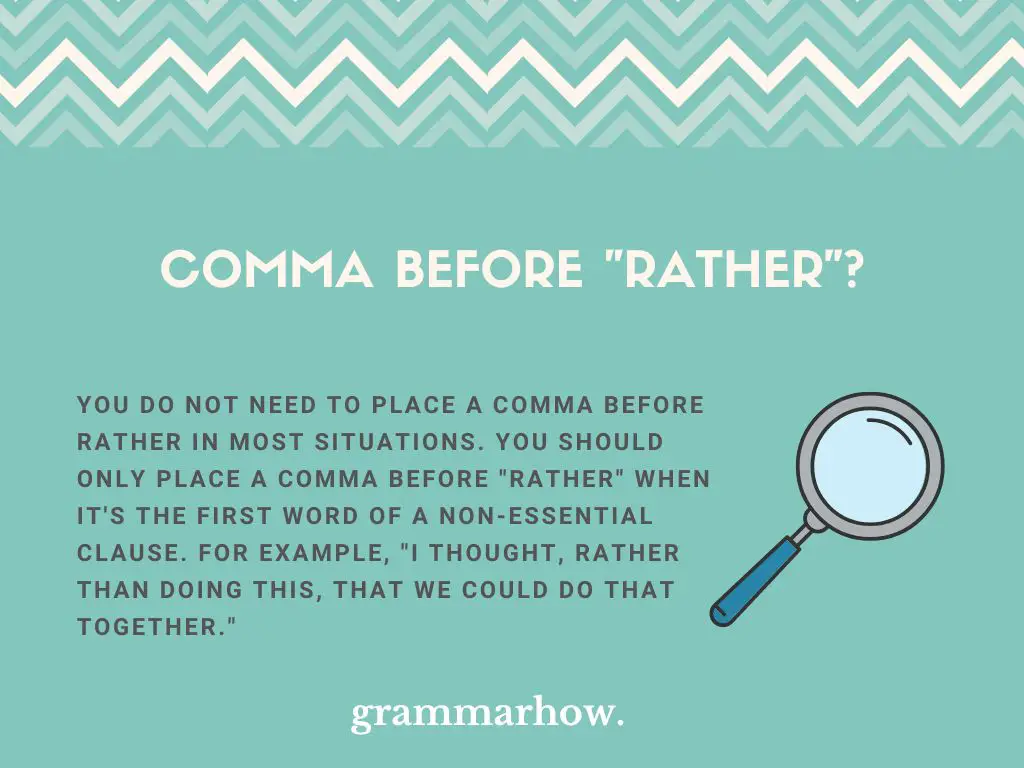“Rather” is an adverb, and it comes with a few rules relating to punctuation. It might help to go over these rules before using it yourself. This article will explain everything you need to know about the commas used around “rather.”
Comma Before “Rather”?
You do not need to place a comma before rather in most situations. You should only place a comma before “rather” when it’s the first word of a non-essential clause. For example, “I thought, rather than doing this, that we could do that together.”

KEY TAKEAWAYS
- “Rather” rarely needs punctuation.
- You only place a comma before “rather” when it’s the first word in a non-essential clause.
These examples will demonstrate how to use a comma with rather in the middle of a sentence:
- I decided that, rather than go out tonight, we should stay indoors.
- I thought that, rather than being alone, I would go and see Sarah.
This non-essential construct isn’t all that common when using “rather.” Instead, you’ll often find people place the non-essential clause towards the end of the sentence;
- I decided that we should stay indoors rather than go out tonight.
This way, no comma is needed with “rather.” It’s a finicky thing, but native speakers try to avoid unnecessary punctuation by jumbling their sentences into more concise forms.
You may refer to The Chicago Manual of Style and the AP Stylebook to learn more about comma rules with adverbs. Since “rather” is not a conjunctive adverb, it does not come at a point in the sentence which requires commas. You should not group multiple clauses with it.
When to Place a Comma Before “Rather”
You should only place a comma before “rather” when it is part of a non-essential clause.
If you can remove the “rather” clause from the sentence and it still makes sense, it is part of a non-essential clause. It’s easy to test this in most written cases.
- She waited, rather than milled, for someone to come along.
- I told them that, rather than pester me again, they could go and see the advisor themselves.
Here, “rather” is used as the first word of a non-essential clause. Thus, a comma comes before it to offset the clause from the rest of the “essential” sentence.
The same rules apply regardless of how “rather” is used. You should place a comma before rather than, which is a common phrase used with “rather” to compare two things.
When to Use “Rather” Without a Comma
“Rather” without a comma is the most common way to see it in English. “Rather” is an adverb which mainly modifies verbs, adverbs, and adjectives, meaning that no commas are required.
When “rather” directly modifies a verb, it does not need a comma around it. When modifying a verb, “rather” is used to show preferences or decisions.
Here are some examples to demonstrate this:
- Would you rather do this one together? I’m not sure whether that’ll work.
- I would rather not have to worry about this right now. I’m too busy with other stuff.
You may also find “rather” modifying adverbs. No commas are needed because “rather” is used to determine the intensity of the adverb.
Check out these examples to see how it works:
- She looked at them both rather fondly. I’m not sure what she was thinking.
- He is rather suspiciously going about his day right now.
You may also modify adjectives with “rather.” This means that different descriptive words are given a level of intensity based on the usage of “rather.”
These examples will show you how it works:
- I’m rather glad you didn’t come today. It was a complete disaster.
- Aren’t you rather appalled by all of this? It’s terrible news.
Comma After “Rather”?
It’s possible to place a comma after rather at the beginning of a sentence. You can do this in rare cases when “rather” is an introductory adverb introducing a new idea.
- I did not want to go there. Rather, I wanted to go here.
- She told me all about it. Rather, she yelled it all to me.
Here, “rather” is the first word of a new sentence. You should place a comma after it to separate it from the remainder of the clause.
In this way, “rather” is a sentence adverb. It modifies the following sentence as a whole, showing that someone would “rather” fulfil whatever comes up in the sentence.

Martin holds a Master’s degree in Finance and International Business. He has six years of experience in professional communication with clients, executives, and colleagues. Furthermore, he has teaching experience from Aarhus University. Martin has been featured as an expert in communication and teaching on Forbes and Shopify. Read more about Martin here.
